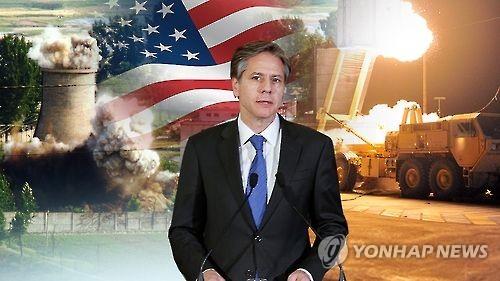ID :
410928
Thu, 06/30/2016 - 03:39
Auther :
Shortlink :
https://oananews.org//node/410928
The shortlink copeid
Blinken: U.S. protection prevents S. Korea, Japan from going nuclear

By Chang Jae-soon
WASHINGTON, June 29 (Yonhap) -- South Korea and Japan would seek to develop their own nuclear weapons if the U.S. ends protection of the Asian allies, U.S. Deputy Secretary of State Tony Blinken said Wednesday.
Blinken made the remark at a security forum in Washington, stressing the importance of U.S. alliances and security commitments overseas, as concerns have grown about the potential negative effects Republican presidential candidate Donald Trump could have on alliances if he is elected.
"Without our security guarantees, advanced nations like Japan and South Korea would seek to develop their own nuclear arsenals, plunging the world into regional nuclear arms races, something the administrations of both parties have worked so hard to prevent for decades," he said at the Center for Strategic and International Studies.
Trump has long argued that the U.S. should no longer be the "policeman of the world," claiming that it makes no sense for the U.S. to help defend such wealthy allies and partners as Japan, South Korea and Saudi Arabia in exchange for little.
He says allies should pay 100 percent of the cost of stationing American troops, or the U.S. should be prepared to end their protection. He even suggested allowing South Korea and Japan to develop their own nuclear weapons for self-defense so as to reduce U.S. security burdens.
In an apparent swipe at Trum, Blinken stressed that the benefits of alliances greatly outweigh their costs.
"There are those who suggest that alliances are simply more of a burden than a benefit. They cost too much. They achieve too little. They encourage free riders. They risk embroiling us in another people's problems. They distract us from investing at home. They generally leave us with the short end of the stick," Blinken said.
The No. 2 American diplomat said the argument is "fundamentally flawed" as it overstates the cost of the alliance while underestimating the "risks of turning inward and abandoning them, and certainly downplaying their benefits and virtues."
"Everyday, our allies and partners serve as the frontline of our defense, enabling us to stay ahead of our enemies and project our presence without the even higher cost of a permanent footprint in every corner of the globe. Put simply, the world is safer for the American people when we have friends, partners and allies," he said.
Blinken also said alliances are "our insurance policy worth the cost of their premiums for the moment when we need them most."
Blinken also noted that the U.S. is working closely with allies to modernize their relationships.
"Just in the last three years, we've updated our guidelines for our defense cooperation with Japan to expand its contributions to international security. We concluded a new host nation support agreement with both Japan and the Republic of Korea to help support our military presence in both countries," he said.
jschang@yna.co.kr
(END)





